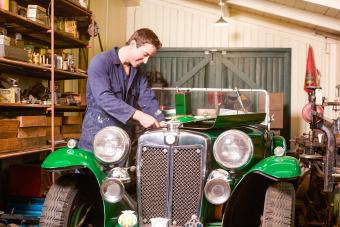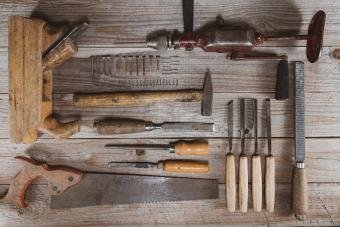
Classic cars are one of the most fascinating parts of the 20th century American mythos, and their mere presence on the road ignites a sense of challenge and freedom. Yet, these 50+-year-old cars didn't get their high gloss paint jobs overnight. Classic car restoration is an incredibly involved and complex undertaking and isn't for the faint of heart, but with the proper guidance and preparation, you can turn your broken down Chevy into something spectacular.
What Is a Car Restoration?
A car restoration is the process that you undergo when you take an aged vehicle and update some of, or most of, its parts. In terms of a pure restoration, the person working on the car is trying to restore the car back to its stock condition; aka, the state it was in when it rolled off of the assembly line. This involves finding genuine old parts (if you're trying to have as accurate of a restoration as possible, and giving it a higher graded restoration for show) or reproduction parts to put into the car.
However, there are no rules saying that you have to return your car back to its stock condition; rather, if you're feeling saucy and you'd like to add some modern amenities like air bags and air conditioning to your classic ride, then you can incorporate those into your restoration. These projects are called restomods, as they're restored and modified cars. Cars with substantial modifications and limited period-accurate restorations are referred to as pro touring projects.
How Much Do Restorations Cost?
You'd better buckle up because the costs of these restorations can blow your mind. According to Rob's Customs & Restorations, there's a whole host of factors that can contribute to what the costs for any specific project are going to total up to. Things like the body and frame's condition, the quality of restoration you're looking for, how easy it is to find replacement parts, and the number of hours/labor it's going to take to get what you want all determine what the final number's going to be. You can easily spend upwards of $50,000 on a single restoration for an altogether not too rare vehicle.
Thus, if you're thinking about restoring an old car of yours, then you should definitely contact a professional at the very least to get a better idea of what your out-of-pocket costs are going to be.
Can Any Type of Car be Restored?
Any type of vehicle can be restored; now, depending on its make and model, some are easier to restore than others. Classic American brands like Chevrolet have a lot of information about their back catalog available as well as have molds to make reproduction parts, like auto badges, for example. More niche vehicles might take a lot more care, and possibly involve using non-model specific parts, which can decrease the vehicle's value from the get go.

Important Tips to Keep in Mind About Car Restorations
Restoring any vehicle, no matter its condition, is an intense endeavor. Thus, you want to be fully prepared for the undertaking. Here are a couple of tips for the restoration process to keep in mind.
Determine the Reason for Restoration
Most people who don't have a business of restoring cars and selling them at auction or to collectors want to complete restorations because of sentimental reasons. Cue the sounds of Nat King Cole's rich voice. So, if you've got your grandparents' family car that's been sitting in a garage somewhere that you want to put back together because you want to relive those childhood memories, that's completely fine. However, you need to be honest about why you're completing the restoration, because this can inform how much you're willing to spend and how much work you're willing to put into it.

Make a Budget
The budget is a crucial aspect for any restoration project. These are highly variable, and can be in the low ten thousands to close to a hundred thousand dollars. Thankfully, if you're not invested in trying to bring the car up to auto auction quality, then you can scrimp and save on aesthetic work and just get the bare minimum parts needed to have the vehicle running again.
Set a Deadline
Deadlines are the second most crucial aspect of any restoration project. It's all too easy for restorations to get out of hand because of the amount of work that goes into them. You'll look up one day and see that you're over budget and half a year into a project you thought was going to take a month. So, set a firm deadline for when you want to have your car finished so that you actually see it through. As seasoned restorationist Steve White explains, restorations are "a labor of love, and you should only undertake a…project if you're willing to commit to completing it."
Contact a Professional
Ultimately, the best piece of advice for completing a restoration is contacting a professional and having them do it. There's definitely a cultural obsession with the layman pounding out the dents in the fender of a beat-up car in their garage, but this is ill-advised. If you don't have an extensive knowledge of mechanics and have the tools and connections to complete the project, then it's best if you don't mess with it at all and just pay a professional to do their job. They'll do it on time, and it'll be exactly what you were hoping for.

Places to Source Classic Car Parts
However, if you're dead set on trying to start your own restoration, then your first stop--after finding your car, of course--is to source the necessary parts that you're going to need to put it back together again. These are some of the best places online that you can head to for cars in a variety of makes and models.
- Rock Auto - Provides parts for cars from all sorts of common and obscure makes and models.
- JDM Car Part - Provides parts for cars from vintage Datsuns, Toyotas, Hondas, and Subarus.
- Andy Bernbaum Auto Parts - Provides parts for cars from Chrysler's catalog.
- The Lincoln/Mercury Old Parts Store - Provides parts for Lincoln and Mercury vehicles.
- Classic Industries Parts & Accessories - Provides parts for a variety of classic cars.
If you can't find what you're looking for online, you can also visit local salvage yards to see if they've got anything comparable in their inventory that you can strip for parts or classic car shows and meetups to connect with people who either make those parts themselves or have some they can sell you.
Hit the Road Jack
There's nothing as primal as driving down the open road in a piece of auto history that was made to tear up the asphalt, and classic car restorations are one way that you can get that full American road trip experience. However, these projects are laborious, expensive, and involve a lot of expertise. So, just in the way that you've hunted down your favorite hair dresser, you should find the perfect professional to make your classic car road worthy again.







